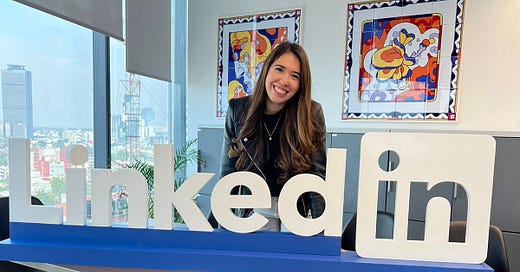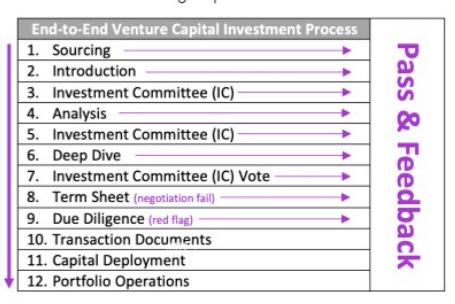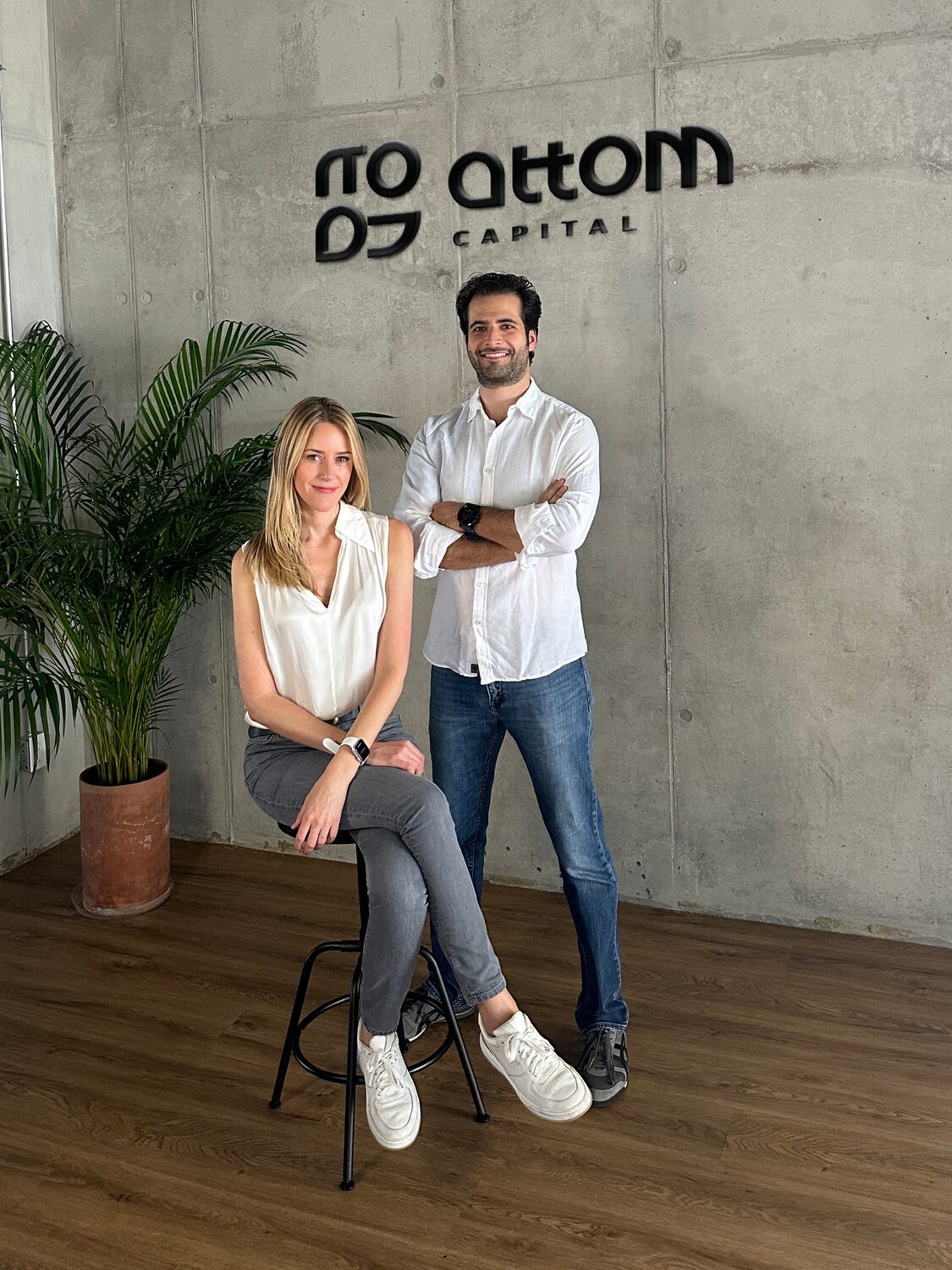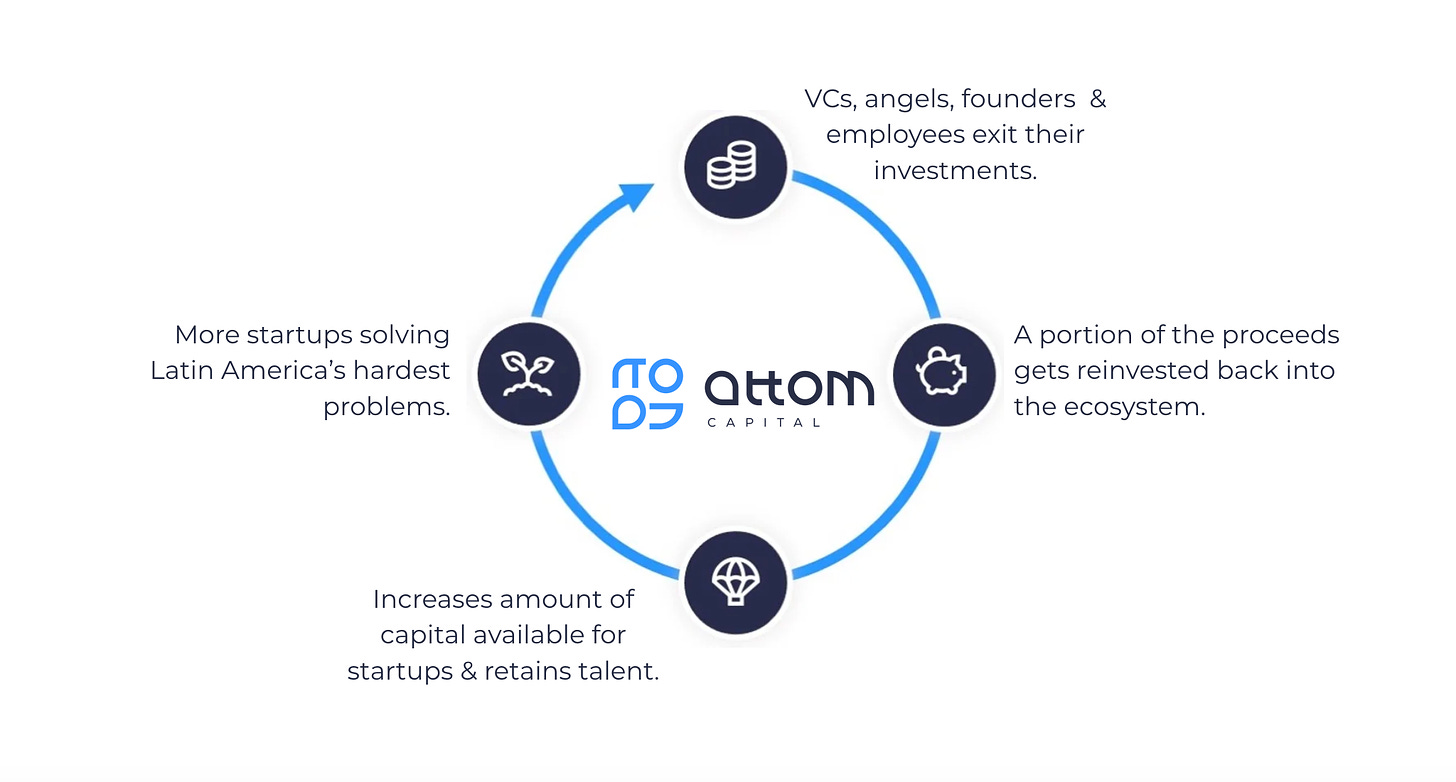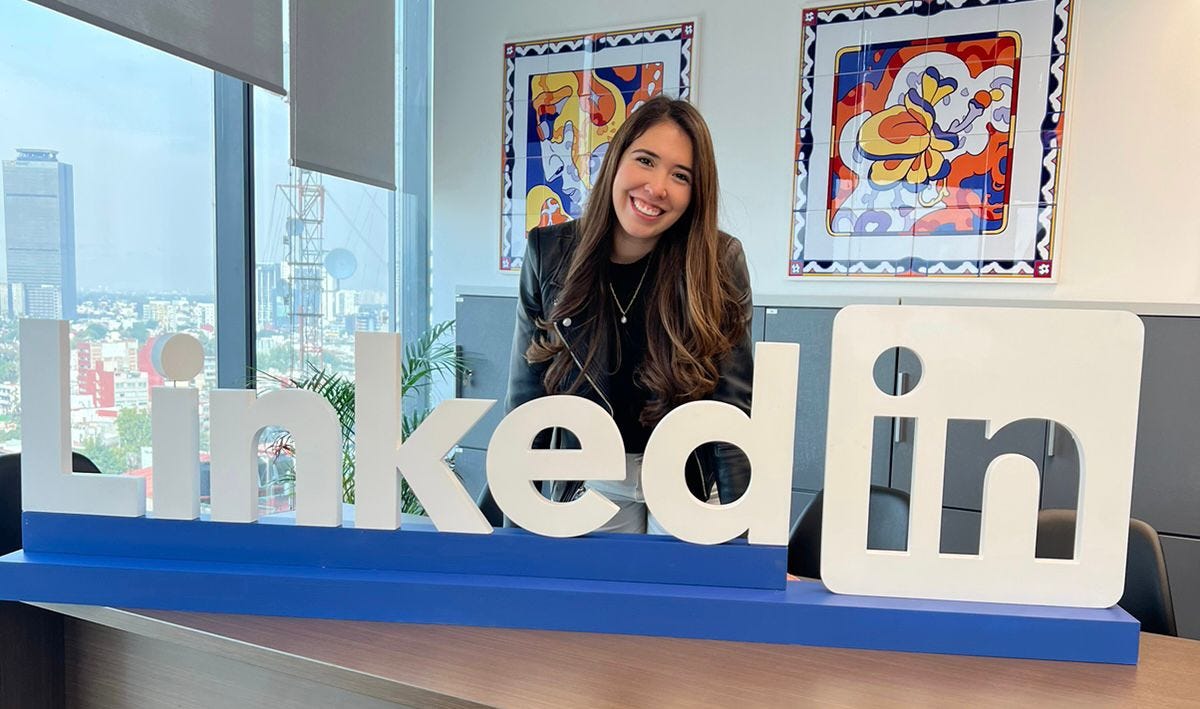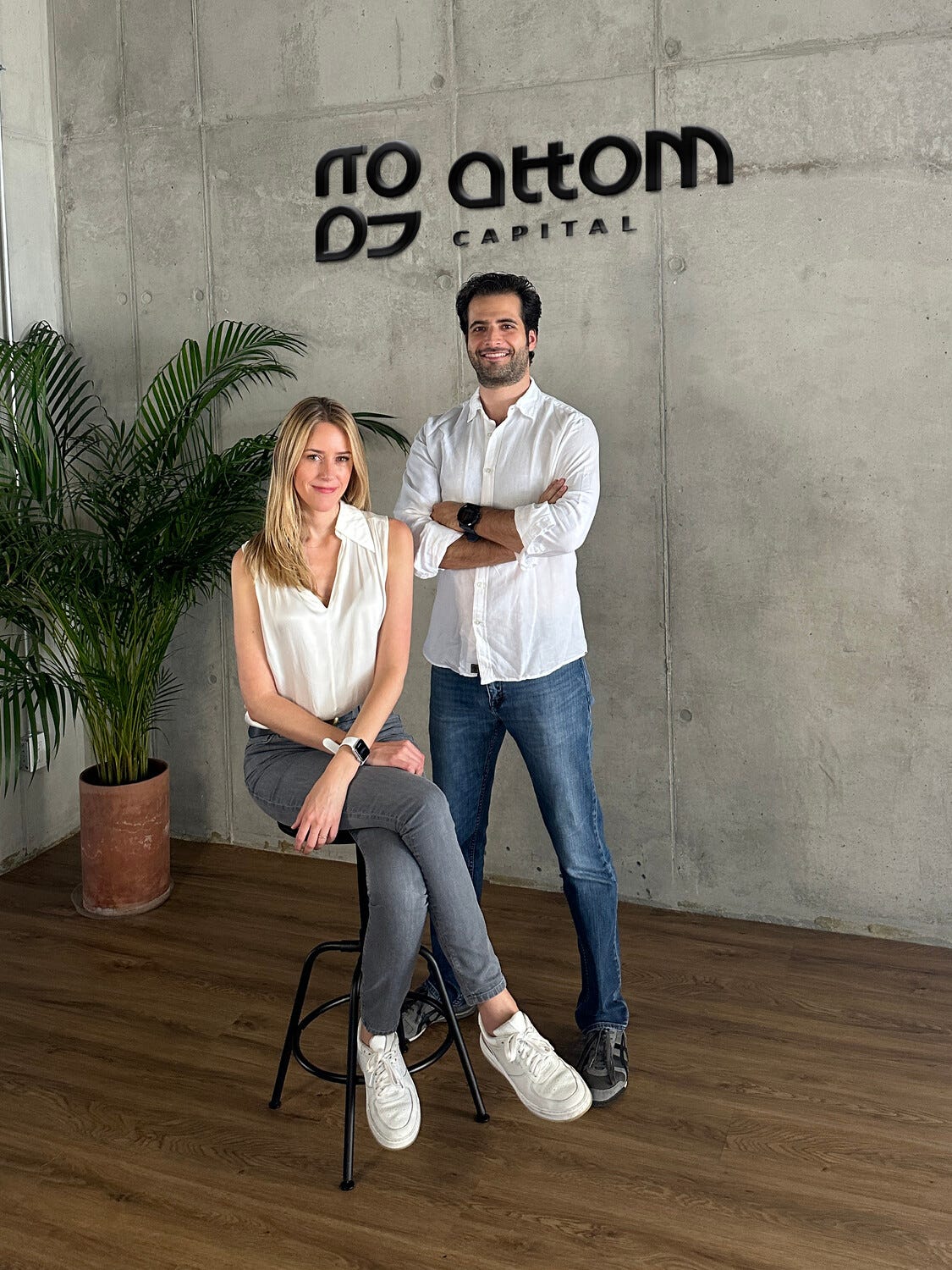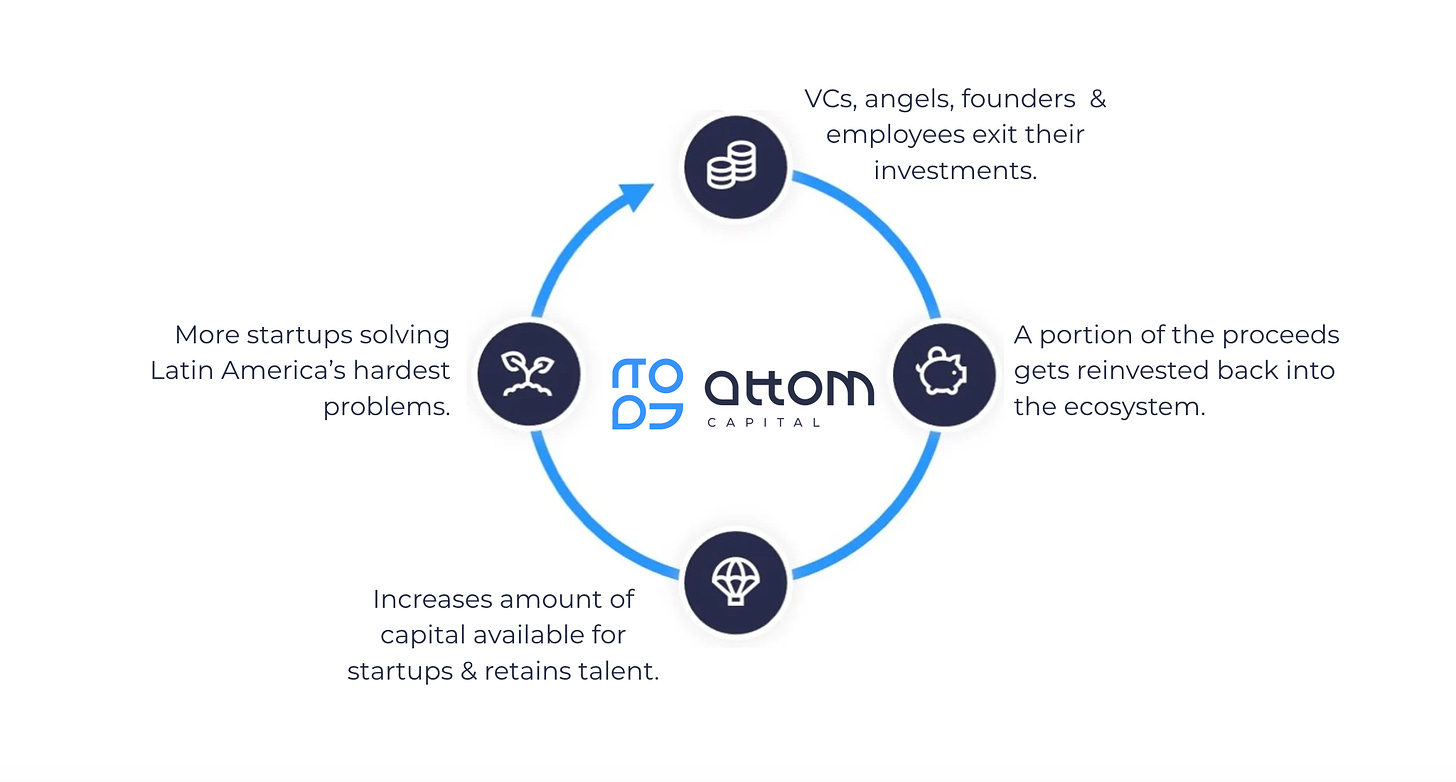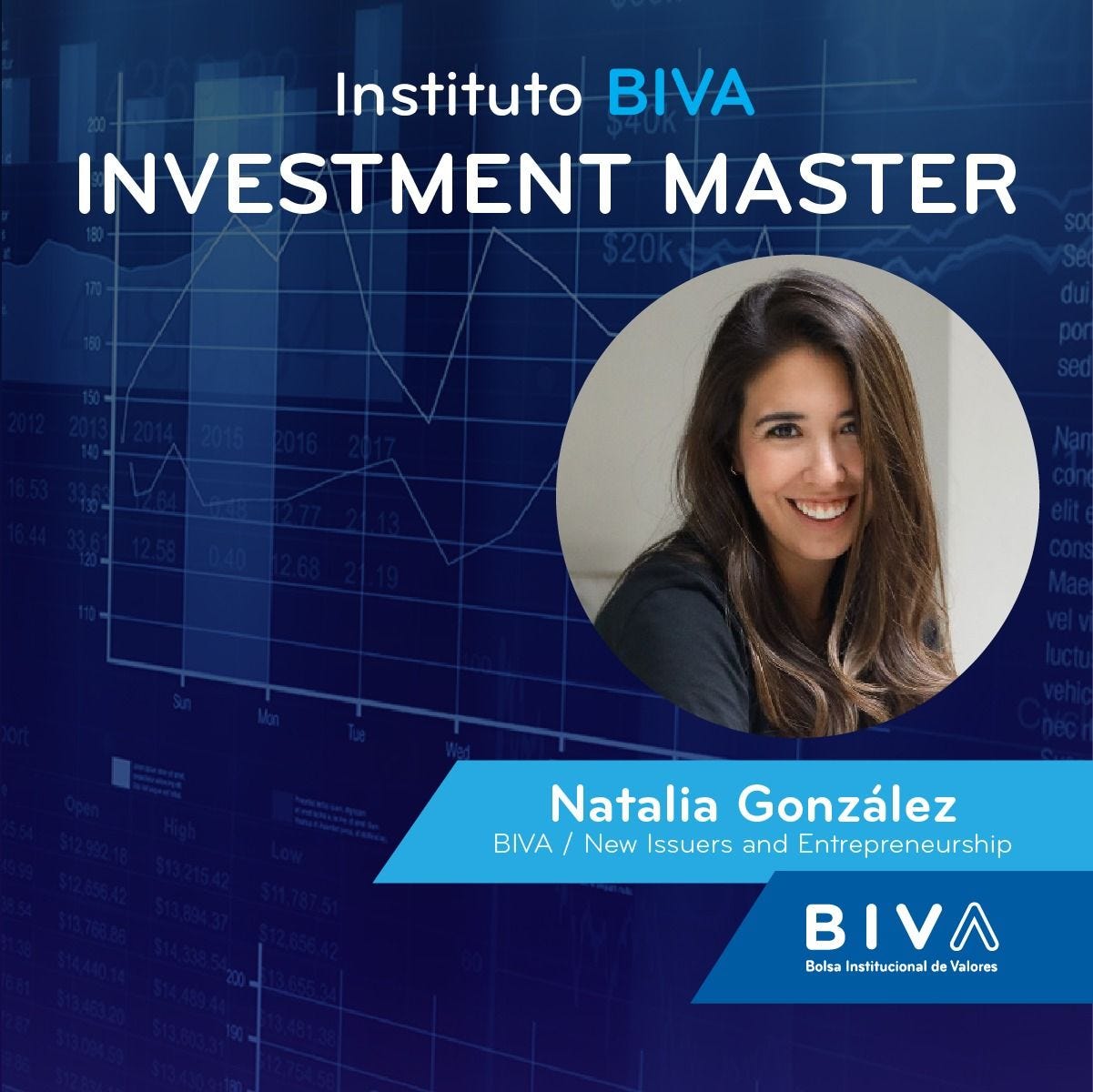La Neta del VC 🚀: Capítulo 24 / Chapter 24
Proceso de VC, unicornio existencial, etc. / VC process, existencial unicorn, etc.
¡Bienvenidos nuevamente a La Neta del VC!
⭐ For English version of Chapter 24, click here / scroll down.
No puedo creer que ya estemos finalizando octubre, ¡el tiempo voló este año! 💫
Antes de empezar con las preguntas de esta semana, quiero comentarles unas cositas:
¡Soy oficialmente Top Voice de LinkedIn! 📣 🙌
Muchas gracias a todos los emprendedores y seguidores que me envían preguntas, leen La Neta del VC y que interactúan con mis contenidos en LinkedIn. Todas y todos hacen que este contenido y esta comunidad sean posibles 😊
Da clic acá para enterarte en detalle.
¡Feliz México Tech Week! 🤖 🇲🇽
Estaré co-presentando 4 eventos de La Neta del VC, incluyendo el evento del primer aniversario de La Neta del VC haciendo equipo con los #cracks Karla Berman y Creel. Esperen muchas netas al respecto...
🎤 Inversiones de Venture Capital - Nati #LaNetadelVC
🎤 Operaciones de Venture Capital - Karla Berman
🎤 Aspectos legales del Venture Capital - Jorge Montano
La neta, estará increíble. Inscríbete aquí.
Para ver el calendario completo de eventos de México Tech Week, haz clic acá.
Emocionante - ¡hoy tenemos nuestro primer invitado ⭐ en La Neta del VC! Alex Souza de Founder Existencial
Alex, quien tiene una historia verdaderamente increíble como emprendedor, se dio a la tarea de destilar sus lecciones aprendidas en una serie de impactantes posts en LinkedIn (colega Top Voice de LinkedIn) y en un súper newsletter donde comparte filosofía práctica, herramientas e inspiración para ayudar a los emprendedores a ganar el juego interno del emprendimiento dominando su propósito, mentalidad y procesos.
Alex nos recuerda que la verdadera startup es nuestra vida. Su pasión es ayudarnos a construir un unicornio existencial 🦄
¡Suscríbete a Founder Existencial aquí! Alex, ¡Gracias por formar parte de La Neta del VC!
Tabla de Contenido: La neta…
🌟Da clic sobre el # de la pregunta para ir directamente a ella, y luego regresar a la tabla de contenido
P1. ¿Cómo es un proceso de inversión de VC de principio a fin?
P2. ¿Cómo convertirse en un emprendedor excepcional con el que los VC quieran trabajar, sin perderse o sacrificarse como persona? Por Alex Souza
P3. ¿Qué opinan los VC de los líderes fraccionarios C-Suite (o fractional C-Suite leaders, en inglés), versus de los asesores comunes?
Bueno, sin más preámbulos, ¡pasemos a nuestras netas de hoy!
P1. ¿Cómo es un proceso de inversión de VC de principio a fin?
¡Aquí les tengo la respuesta! Vamos a desglosarlo…
👉 Para ver la versión en su formato más friendly, puedes ver este popular carrusel en LinkedIn.
Aunque cada fondo funciona distinto, aquí va un ejemplo de un proceso típico de inversión de un fondo líder VC Early-Stage.
Ten presente que en cualquier momento del proceso, los VC pueden descartar la oportunidad de inversión y dar su feedback.
🟣 Búsqueda de startups:
Encontrar las mejores oportunidades
Buscar buenas inversiones es una parte esencial del VC.
En general, existen dos grandes vías de búsqueda que segmentan las startups:
Inbound: Los emprendedores envían a los VC intro emails y decks para que revisen la oportunidad del emprendimiento.
Outbound: Los VC contactan a los emprendedores para conversar sobre su startup y explorar la oportunidad.
🟣 Introducción:
Revisión del deck y llamada introductoria
Revisar el deck suele ser el primer filtro para un VC.
El deck es cómo un VC analiza la oportunidad con respecto a la tesis de inversión del fondo.
Los parámetros de la tesis incluye: ubicación geográfica, fase, sector, modelo de negocio, liderazgo o seguimiento, etc.
Si el emprendimiento no se ajusta a la tesis del fondo, se descarta y se da ese feedback.
Para más detalles sobre las tesis de inversión de los VC, lee la P4 del Capítulo 6 en La Neta del VC.
🟣 Comité de Inversiones (IC):
El IC es la reunión normalmente semanal en la que todo el equipo de inversión se reúne para debatir las oportunidades de inversión.
Una vez que un VC ha echado un primer vistazo a la oportunidad de inversión, la presenta en el IC.
El equipo comenta, hace preguntas de seguimiento y determina si merece la pena seguir analizando la oportunidad.
Los socios del fondo participan de todo el proceso, aunque no interactúen directamente con el emprendedor al principio.
🟣 Análisis:
Lo básico sobre el emprendimiento:
En este punto, el VC analizará más seriamente la oportunidad de inversión:
Estudiando detenidamente los detalles del deck.
Revisando el data room completo: estados financieros, los KPI, estudio de mercado, mapa del producto, tecnología, cap table, etc.
Preparando preguntas de seguimiento para las siguientes llamadas.
Haciendo referencias de los emprendedores.
Llevando a cabo un estudio de mercado independiente: por ejemplo, llamadas a clientes, análisis del tamaño de mercado, proceso de ventas, proceso de onboarding...
Etc...
🟣 IC – Segunda Ronda:
Con la nueva información disponible tras el análisis inicial, el VC presenta la oportunidad actualizada al equipo.
Habrá una nueva ronda de preguntas y comentarios por parte del equipo de inversión y el Partner para definir los pasos a seguir.
Se decide si se descarta y da feedback, o bien si se profundizará en el proceso.
🟣 Profundización:
Detalles del emprendimiento:
En este punto, el fondo está considerando seriamente invertir.
El VC trabajará para responder a todas las preguntas y preocupaciones que aún haya para tomar una decisión. Esto incluye:
Llamadas adicionales de preguntas y respuestas a los emprendedores y clientes.
Más llamadas de referencias de los emprendedores.
Detalles de las cláusulas y dinámicas de la cap table.
Estructuración y parámetros de la ronda de inversión.
Otros riesgos y beneficios importantes que hayan surgido a lo largo del proceso.
Etc...
🟣 Votación del IC:
Definir la Term Sheet:
Ha llegado el momento para que los Partners y el equipo decidan. Se ha recopilado y verificado toda la información pertinente durante un plazo de tiempo razonable.
Sí, vamos a invertir = pasamos a la Term Sheet.
No vamos a invertir = pasamos a feedback.
🟣 Term Sheet:
Hagamos un trato:
Una vez que hay luz verde para la inversión, es el momento de la Term Sheet (TS).
Las TS se tratan de dos cosas: economía y control.
Recuerda que una TS no es jurídicamente vinculante, salvo por la cláusula de no-shop.
Para más información sobre las term sheets, lee el capítulo 21 de La Neta del VC.
🟣 Debido Proceso/Due Diligence:
Poniendo los puntos sobre las íes:
Para poder desembolsar, la startup debe someterse a un proceso formal de debido proceso (DD).
Ten en cuenta que una DD es diferente al análisis empresarial que hacen los VC antes de presentar la TS.
Una DD consta de: examen jurídico, financiero, fiscal y laboral de la situación general y constitución.
Si no hay señales de alarma, entonces seguirá todo para adelante.
Para más detalles sobre los data room para la DD post-term sheet, consulta la P5, Capítulo 9 de La Neta del VC.
🟣 Documentos de la transacción:
Poniendo los puntos sobre las íes:
Es oficialmente oficial:
Los documentos de la transacción hacen que la inversión sea jurídicamente vinculante y le dan luz verde al despliegue de capital.
Estos documentos se elaboran paralelamente al DD.
Estas formalidades son importantes porque, recuerda, un VC está manejando dinero ajeno: el de los LP. Un VC tiene una obligación fiduciaria hacia ellos.
Para consultar una lista estándar de documentos de una transacción VC, ve a la P1, Capítulo 21 de La Neta del VC.
🟣 Despliegue del capital:
Ahora $íííí 💰💰💰
La firma de los documentos de la transacción requiere que el VC envíe el capital a los emprendedores.
¡FELICITACIONES! 🎉🎉🎉
Ahora, es el momento de regresar full-time a la actividad preferida de los emprendedores: construir.
Al menos, hasta la próxima ronda...
Recuerda que hay una gran diferencia entre los procesos de inversión de Early-Stage vs. Growth-Stage. Pronto hablaremos más sobre ello ;)
🟣 Operaciones del portafolio:
Dinero inteligente en acción:
“Aportar valor" es una parte importante del discurso del VC hacia los emprendedores, ello implica apoyar a las startups con la adquisición de talento, ventas, otros contactos estratégicos, etc.
Siempre debes poder escribirle a tu VC para pedirle ayuda. Es nuestro trabajo apoyarte y una de las principales razones por las que elegiste trabajar junto a nosotros.
La relación VC <> Emprendedor debe ser de igual a igual. Nuestros intereses están alineados para que tu emprendimiento sea un éxito. Si podemos ayudarte, pregunta.
🟣 TLDR:
P2. ¿Cómo convertirse en un emprendedor excepcional con el que los VC quieran trabajar, sin perderse o sacrificarse como persona?
👉 Por Alex Souza
“Para convertirte en un fundador excepcional, tienes que demostrar que tienes un "Existential-Founder Fit".
Sé que nunca has escuchado el término antes.
Eso es porque yo lo inventé.
Confía en mí y sumérgete en él, porque cambiará de manera radical y para siempre la forma en que te ves a ti mismo y a tu startup.
Olvídate del "Product-Market Fit" (PMF) y del "Founder-Problem Fit" (FPF).
Tener el producto adecuado para el mercado y el equipo fundador adecuado para el problema es crucial, pero no es trascendental.
Muchos fundadores tienen PMF y FPF y todavía están lejos de ser excepcionales...
El "Existential-Founder Fit" significa que tienes la startup adecuada para tu existencia.
Cuando lo tienes, le mandas a los VCs un mensaje ensordecedor que dice:
"No puedo vivir en un mundo donde mi startup no existe".
Significa que tu startup no es solo una extensión de quién eres, sino el mejor vehículo para vivirte y expresarte al máximo.
Significa que tu startup vive y respira tus valores.
Incorpora tu visión.
Hace eco de tu vida.
El "Existential-Founder Fit" es lo que separa a un fundador oportunista de un fundador existencial.
Los fundadores oportunistas inician negocios por razones racionales.
Los fundadores existenciales inician negocios por razones existenciales.
¿Quién crees que tirará la toalla más rápido cuando las cosas se pongan difíciles?
El "Existential-Founder Fit" es el máximo "skin in the game".
Y a los VCs aman el "skin in the game".
Es una señal de qué tan invertido estás, lo cual es una señal de si te rendirás o no, lo que es una señal de qué tan excepcional eres.
Acuérdate que los VCs son detectores de bullsit profesionales, nivel FBI.
Precisamente por eso, sacrificarse o perderte en el proceso nunca te convertirá en un founder excepcional.
Ellos nunca te creerán y tú nunca encontrarás "Existential-Founder Fit".
Porque para encontrar el negocio ideal para tu existencia, debes vivirte auténticamente y ser únicamente y completamente tú.
Siempre.
Para ser excepcional, manifiesta lo existencialmente congruente que es tu startup.”
Gracias Alex por tomarte el tiempo de compartir tu perspectiva y sabiduría con mi comunidad de La Neta del VC 🙌. Si te resonó lo que Alex está compartiendo, síguelo en LinkedIn, suscríbete a Founder Existencial, YYYYY....
En 20 días Alex lanzará su Workshop “Cómo encontrar Existential-Founder Fit”, la metodología detonadora para alinear tu negocio con tu misión de vida o cambiar de rumbo antes de que sea demasiado tarde.
👉 Regístrate a la preventa y obtén un precio especial aquí
P3. ¿Qué opinan los VC de los líderes fraccionarios C-Suite (o fractional C-Suite leaders, en inglés), versus de los asesores comunes?
¡Buena pregunta! 🔎
La idea con los líderes fraccionarios C-Suite (CFO, COO, CHRO, CIO, etc.) se refiere a un modelo en el cual aquellos operadores experimentados proporcionan a un emprendimiento en early-stage su experiencia y expertise a cambio de una asignación de equity superior (más parecida a la de un cofundador) aunque sólo trabajan como medio tiempo.
Okayyy, entiendo que pueda sonar razonable 🤔 para un emprendedor tener a un super operador medio tiempo a cambio de un mayor equity, pero será un problema para un VC. Es una señal de alarma para un inversionista que un emprendedor no esté dedicado al 100% a su startup. Darle a alguien una participación significativa a cambio de trabajo a medio tiempo va a generar la misma señal de alarma 🚨 y un montón de preguntas. Mi consejo: no lo hagas. Impactará negativamente tu cap table. 🙅🏻♀️
Lo que podría funcionar es ofrecerle a un operador de temporada a medio tiempo un paquete de acciones mucho menor (mucho más parecido al equity de un advisor) con una bonificación "salarial" predeterminada si la startup cierra una ronda de Serie A, por ejemplo. Puedes compensar y motivar a los grandes talentos sin diluir demasiado al equipo fundador desde una etapa tan temprana. Busca alternativas atractivas, no pongas en peligro tu cap table. Recuerda que el precio del capital es real. 💰
Aquí les traigo un resumen de cómo es la asignación promedio de acciones para los asesores (advisors en inglés ). Recuerda que siempre puedes negociar al alza o a la baja, y también los periodos de vesting. 👍
*Estratégico incluye apoyo con contrataciones clave
Entonces, ¿cómo sabes cuánto equity le puedes dar a un asesor para tu startup? Aquí tienes algunas claves para tener en cuenta 👇
Contribución del Asesor: Cuanto más valiosa y decisiva sea la contribución del asesor para el éxito de la nueva empresa, mayor será la participación que le corresponda. Piensa si el asesor proporciona orientación estratégica, experiencia en el sector, contactos o trabajo práctico.
Experiencia y Reputación del Asesor: Asesores con un sólido historial, una amplia experiencia en el sector o un nombre destacado en el campo pueden tener una mayor participación en el patrimonio
Etapa del Startup: Las empresas en early-stage pueden ofrecer una mayor participación en el patrimonio a los asesores, ya que a menudo dependen en gran medida de ellos para superar los retos iniciales. A medida que la empresa madura, la concesión de patrimonio para los nuevos asesores puede ser menor.
Periodo de Vesting: Es habitual que las concesiones de patrimonio a los asesores se devenguen con el tiempo. Por ejemplo, el asesor puede recibir un cierto porcentaje por adelantado y luego el resto durante un período de 2 a 4 años. Esto garantiza que el asesor siga aportando valor a la empresa.
Norma del Mercado: Ten en cuenta las normas del sector y lo que otras startups de tu sector ofrecen a los asesores. Es útil investigar los rangos típicos de capital para asegurarse de que su oferta es competitiva. Nota neta, preguntenle los rangos a sus VC. En general tenemos varios puntos de referencia.
Negociación: En última instancia, la concesión de patrimonio a un asesor es una cuestión de negociación. Ambas partes deben discutir abiertamente sus expectativas y llegar a un acuerdo mutuamente aceptable.
Acuerdo con el Asesor: Asegúrate de formalizar la concesión de patrimonio y el papel del asesor en un acuerdo que sea jurídicamente vinculante. Este documento debe describir los términos y condiciones de la concesión de acciones, incluidos los calendarios de vesting, las responsabilidades y los criterios de rendimiento. Recuerda, es gran cosa darle a alguien parte de tu startup. Trátalo con seriedad.
Es esencial encontrar un equilibrio entre reconocer el valor que el asesor trae y asegurarse de no ceder demasiado patrimonio, lo que podría diluir la propiedad de los fundadores y los primeros empleados.
Para más información, consulta este articulo de Carta.
Bueno, ¡hasta la próxima!
Mantente alert@, porque nuevos episodios de La Neta del VC en audio están por salir.
🎤 🙉 🎧
Abrazo ✌️,
Nati
Los Dos ✅ y los Don’ts ❌
Do: Busca formas para ampliar tu mente más allá del trabajo.
Si te pareces en algo a mí, es que ¡amas tu trabajo 💙! Juro que casi ni parece trabajo.
Siempre estoy emocionada por hablar con los emprendedores, escuchar podcasts sobre tecnología y empresas de tecnología, y mantenerme al día con los movimientos del mercado. Soy una auténtica nerd, jaja. Dicho esto, a menudo me sorprendo a mí misma consumida por todas las cosas relacionadas con el trabajo. 📚😂
De vez en cuando, hago un esfuerzo consciente por llevar mi mente a otras áreas de interés (historia, neurociencia, filosofía, bienestar, etc.) para asegurarme de que mi aprendizaje no es tan unidimensional. Cuando hago un esfuerzo por ir más allá de los temas laborales relacionados con la tecnología, las startups y las finanzas, descubro que empiezo a conectar puntos estratégicos y perspicaces que no eran tan obvios dentro de mi burbuja. 🧠⚡
Si tienes otros intereses, que pueden ser literalmente cualquier cosa, te súper animo a que dediques cada semana un ratito para aprender sobre ellos. Es un descanso de la norma, al tiempo que aprendes activamente. Es un Win-Win. 👊 👊
Do Not: No contactes a un VC en LinkedIn con un mensaje que tan solo diga "Hola X, ¿cómo estás?" y ya.
La neta, eso me vuelve loca jaja 😝😝😝. Ayúdame a ayudarte jaja - ¿quién eres y qué necesitas?
Alternativamente, por favor no envíes 10 párrafos en un solo mensaje sobre tu startup. Es desorientador y no es el lugar adecuado para entrar en detalles del tipo nivel 3.
En lugar de eso, preséntate, explica brevemente lo que haces y deja clara tu petición.
Para ver un ejemplo de un gran mensaje de presentación en frío, consulta el Capítulo 9 de La Neta del VC.
La Perla de la Semana ✨
Hay un fondo nuevo en América Latina 🌎, ¡y se llama Attom Capital! 🚀
Hace aproximadamente un mes, Attom Capital, dirigido por los cofundadores y socios directores Antonia Rojas Eing e Íñigo Martínez Gil, apareció en escena en América Latina para hacer frente a un apremiante déficit de liquidez en la región. 💪💡
Attom se enfoca en brindar soluciones de liquidez a empresas de alto crecimiento a través de operaciones secundarias estratégicas, a la vez de apoyar a los emprendedores más visionarios de la región. Estoy absolutamente convencida de que este tipo de inversión de venture capital creativa es exactamente lo que América Latina necesita para seguir avanzando como ecosistema tecnológico, de emprendimiento y de VC.
Conozco personalmente a Antonia y a Íñigo, y por eso estoy segura de su empeño en que Attom sea un éxito y, al mismo tiempo, impulse la frontera del desarrollo y las posibilidades en América Latina.
¡Felicidades, amigos! ¡El ecosistema necesitaba este tipo de liderazgo! 🙌 🙌
Estoy muy emocionada por lo que está por venir. ¡Vamos Attom!
Para conocer más a Attom Capital…
Reconocimientos 📣
Recuerden que hoy empieza Tech Week. Hay muchísimos eventos increíbles durante toda la semana, 4 de ellos organizados por La Neta del VC. Consulta el calendario de eventos aquí.
En BIVA, la Bolsa Mexicana de Valores, estamos comprometidos con la transformación de los mercados de capitales mexicanos a través de la innovación, la tecnología y una mayor accesibilidad.
Una gran parte de esa misión son nuestros esfuerzos educativos en torno a la capacitación de la próxima generación de inversionistas y profesionales financieros en México.
Por eso, nuestro Instituto BIVA lanzó su curso Maestro Inversionista, el cual ofrece más de 90 horas de conferencias y experiencias relacionadas con las finanzas para ayudar a los profesionales a entender el extenso mundo de las finanzas. 👊
Tuve la oportunidad de dirigir la plática sobre el levantamiento de fondos de Venture Capital a través de mi contenido de La Neta del VC, pero este curso va mucho más allá del VC. También incluye banca comercial, banca de inversión, ventas y trading, introducción a ser Chief Financial Officer, un taller de valoración y mucho más. Todas las conferencias son conducidas por líderes en finanzas de México y Estados Unidos.
Les súper recomiendo a los lectores que sientan curiosidad por todo lo que existe dentro de las finanzas que consideren inscribirse al curso del próximo año. Si eres estudiante universitario, tienes derecho a un descuento.
¡Gracias BIVA! Me siento muy orgullosa de formar parte de este equipo. 🚀
Amela es una organización dedicada al empoderamiento de las mujeres emprendedoras y está organizando una serie de experiencias y eventos fantásticos en torno al emprendimiento y al levantamiento de fondos. Recientemente, lanzó su campamento de levantamiento de fondos.
Si eres una mujer emprendedora, ¡te animo a unirte a esta comunidad! Amela es una fuente increíble de apoyo, formación e inspiración a lo largo del tumultuoso pero extremadamente gratificante viaje de ser emprendedora. 💪
El informe trimestral de Pitchbook sobre emprendimiento y capital emprendedor está aquí. Tengo mis propias ideas, pero revisa el informe aquí y saca tus conclusiones 🙂.
Capria Ventures es un fondo de capital emprendedor, especializado en el Sur Global e invierte en IA Generativa aplicada. Actualmente está en proceso de contratar a un Analista Senior en América Latina ubicado en Ciudad de México o Sao Paulo y un Investment Fellow en Brasil. Es un equipo muy sólido y experimentado con una red amplia y única. 🌎💪
Pues nada, estoy a punto de ponerme de nerd con todos los podcasts que he estado escuchando últimamente. Prepárate jaja es un montón. Por eso decía que a veces me tengo que obligar a mí misma a involucrarme con mis otras áreas de interés jajaja 😂
Karla Berman y René Lankenau de Whitepaper México recientemente lanzaron un nuevo podcast: Whitepaper 10. Un podcast semanal que discute los eventos semanales más relevantes en México.
Ya van dos episodios y soy una fiel seguidora. El contenido es fantástico, muy propio tanto de Karla como de Whitepaper. ¡Felicitaciones! 👏👏
Hablando del rey de Roma... René acaba de entrevistar a David Vélez, Cofundador y CEO de Nubank como parte de Whitepaper. ¡No querrás perderte esta entrevista! Siempre me impresiona la claridad de pensamiento y las explicaciones de David. ¡Escúchala yaaa!
Además, adivinen qué... ¡Nubank solicitó oficialmente su licencia bancaria en México!
Nubank está entrando de lleno en el mercado mexicano y estoy emocionada por ver qué va a pasar. Si hay algo que sin duda podemos decir de Nubank es que nunca huyen de un reto. ¡Adelante! Más info por acá.
Ya que estamos hablando de Nubank, escucha también la nueva entrevista con David para el podcast 20VC. Más ideas originales de David y aprendizajes del mayor neobanco del mundo.
Gina Gotthilf, cofundadora de Latitud, una gran amiga y una crack total, fue entrevistada recientemente en Lenny's Podcast, el podcast, en mi opinión, número uno sobre productos para emprendimientos, donde compartió las lecciones aprendidas a lo largo de su carrera en Tumblr, Duolingo, La campaña presidencial de Mike Bloomberg y Latitud. Es imprescindible escucharla.
Para cerrar con broche de oro, Iván Montoya participó en el podcast 500 Startups Angeles de LatAm. Conozco a Iván, pero en este podcast aprendí cosas nuevas sobre él y su estilo de inversión. ¡Escúchenlo! Me encanta que tengamos más gente de USA dedicada a invertir en Latinoamérica. ¡Vamos!
🙋♂️🙋♀️ Pregúntame lo que quieras aqui
🎯Más de 101 preguntas sobre VC respondidas, aquí
💙 Aprende cómo comenzó La Neta del VC, mas sobre mi, y qué significa "neta", aquí
🤓 Cuéntame qué te parece el boletín La Neta del VC aqui
🚀 Sígueme en LinkedIn: Natalia Gonzalez Vela
📣 Sígueme en Twitter: @NataliaGonzVela
Welcome Back to La Neta del VC!
⭐ Para version en español del Capítulo 24, clic aqui / desplácese hasta la parte superior.
I can’t believe it is already the end of October - time flew this year! 💫
A few quick things before diving into our questions for this week:
I’m officially a LinkedIn Top Voice! 📣 🙌
A huge thanks to all the founders and followers that submit questions, read La Neta del VC, and engage with my content on LinkedIn. You all make this content and community possible 😊
Happy Mexico Tech Week! 🤖 🇲🇽
I am co-hosting 4 La Neta del VC events, including La Neta del VC’s 1 year anniversary event by teaming up with #cracks Karla Berman and Creel. Expect netas around…
🎤 Venture capital investing - Nati #LaNetadelVC
🎤 Venture capital operations - Karla Berman
🎤 Venture capital legal aspects - Jorge Montano
La neta, it’s going to be awesome. Click here to sign up.
For a full calendar of Mexico Tech Week events, click here.
Exciting - today we have our very first guest writer ⭐ as part of La Neta del VC! Alex Souza from Founder Existencial.
Alex, who has a truly incredible story as a founder, took it upon himself to distill his lessons learned into a series of impactful posts on LinkedIn (fellow LinkedIn Top Voice) and a super newsletter where he shares practical philosophy, tools, and inspiration to help founders win the inner game of entrepreneurship by mastering their purpose, mindset, and processes 👏
Alex reminds us that the real startup is our life. His passion is to help us build an existential unicorn 🦄
Subscribe to Founder Existencial here! Thank you for being a part of La Neta del VC!
Table of Contents: La neta…
🌟Click on the question # to jump to the answer and back to the table of contents
Q1: What’s a VC investment process like end-to-end?
Q2: How do you become an exceptional founder VC want to work with, without losing / sacrificing yourself as a person? By Alex Souza
Q3: How do VC’s feel about fractional C-Suite leaders instead of typical advisors?
Alright, without further ado let’s get into our netas for today!
Q1. What’s a VC investment process like end-to-end?
You got it - let's break it down!
👉 For the spark notes version of this process, check out this popular content in carousel form on LinkedIn.
Although every fund operates a bit differently, here is a typical end-to-end investment process for an Early-Stage VC.
Note, a “pass” and feedback can be given at any point in the process.
🟣 Sourcing:
Finding Great Opportunities
Sourcing investments is a huge part of venture capital.
In general, there are 2 big sourcing channels that segment deal flow:
Inbound: Founders send VCs intro emails and decks to review and explore the startup opportunity
Outbound: VCs reach out to founders to chat about their startup and explore the opportunity
🟣 Introduction:
Deck Review and Intro Call:
Reviewing the deck is usually the first filter for a VC
The deck is how a VC screens the opportunity against the fund’s investment thesis.
Thesis parameters include: geography, stage, industry, business model, lead vs. follow, etc.
If the startup does not fall within the fund’s thesis, it’s moved to pass & feedback
For more details on VC investment theses, see Chapter 6, Q4 La Neta del VC
🟣 Investment Committee:
Intro:
IC is the weekly or bi-weekly meeting where the entire investment team comes together to discuss investment opportunities.
Once a VC has taken a first good look at the investment opportunity, he / she presents it at IC
The team makes comments, asks follow up questions, and determines if it is worth analyzing further
The fund’s Partners are involved throughout the entire process even if not directly interacting with the founder at the beginning
🟣 Analysis:
Startup Basics:
At this point, the VC will begin to more seriously analyze the opportunity for investment:
Study deck details carefully
Review full data room: financials, KPIs, market research, product map, technology, cap table, etc.
Prepare follow-up questions for next call(s)
Begin founders reference checks
Conduct independent market research - e.g. customer calls, sizing analysis, sales process, onboarding process
Etc…
🟣 Investment Committee:
Round 2:
With the new information available from initial analysis, the VC presents the updated opportunity to the investment team
Again, comments and questions by the investment team and Partner in order to determine next steps
Decision is made on whether to pass and provide feedback or to move into a serious deep dive
🟣 Deep Dive:
Startup Details:
At this point, the fund is seriously considering investing in the startup. The VC will work to address all of the team’s pending questions and concerns in order to come to an investment decision. Includes:
Additional Q&A calls and customer calls
More reference checks on founder(s)
Details of of cap table clauses and dynamics
Investment round build out and parameters
Other key risks / benefits that emerged throughout the process
Etc…
🟣 Investment Committee Vote:
Determine Term Sheet:
It is time for the Partners / team to make a decision. All relevant and reasonable business information has been gathered and verified during a decent time frame
Yes, let’s invest = move to term sheet
No, let’s pass = move to pass and feedback
🟣 Term Sheet:
Let’s Make a Deal:
Once the there is greenlight for the investment, it’s term sheet (TS) time
At the highest level, term sheets are about 2 things - economics & control
Remember, a TS is not legally binding, except for the no-shop clause
For details regarding all things term sheets, check out Chapter 21 La Neta del VC
🟣 Due Diligence:
Crossing the “t”s and dotting the “i”s:
In order to deploy the capital, the startup has to undergo a formal due diligence (DD)
Note, a DD is different than the business analysis done by a VCs pre-term sheet
A DD consists of: legal, financial, tax, and labor review of the startup’s overall standing and incorporation
If no red flags are found, then everything is good to go
For details on post-term sheet DD data rooms, check out Chapter 9, Q5 La Neta del VC
🟣 Transaction Documents:
It’s officially official:
Transaction documents make the investment legally binding and greenlights the capital deployment
These document are built alongside the DD process
Formalities are important because remember a VC is managing third-party money from Limited Partners (LP). A VC has a fiduciary obligation towards the LPs
For a list of standard transaction documents for a VC deal, check out Chapter 21, Q1 o La Neta del VC
🟣 Capital Deployment:
It’s Go Time💰💰💰
Signing the deal requires the VC to send the capital to founders
CONGRATS!!! 🎉🎉🎉
Now, it’s time to GET back to what every founders rather be doing, building
That is until the next round...
Remember there is a big difference between Early-Stage vs. Growth-Stage investment processes. More to come on this topic soon...stay tuned ;)
🟣 Portfolio Operations:
Smart Money in Action:
“Adding value” is s huge part of the VC pitch towards founders, which means supporting startups with talent acquisition, sales machine, other strategic contacts, etc
You should always feel free to message your VC asking for help. It is out job to support you, and a huge reason you choose to work with us
This VC <> Founder relationship should be a partner of equals. Our interests are aligned in making your startup a success. If we can help, ask away.
🟣 Too Long Didn’t Read:
TL;DR
Q2. How do you become an exceptional founder VC want to work with, without losing / sacrificing yourself as a person?
👉 By Alex Souza
“In order to become an exceptional founder, you need to prove you have “Existential-Founder Fit”.
I know you’ve never heard the term before.
That’s because I made it up.
Trust me and lean into it, for it will radically and forever change the way you see yourself and your startup.
Forget about “Product-Market Fit” (PMF) and “Founder-Problem Fit” (FPF).
Having the right product for the market and the right founding team for the problem is crucial, but it isn’t transcendental.
Many founders have PMF and FPF and are still far from exceptional…
“Existential-Founder Fit” means you have the right startup for your existence.
When you have it you send VCs a deafening message that says:
“I cannot live in a world where my startup doesn’t exist”.
It means your startup is not only an extension of who you are but the best vessel for living yourself to the fullest.
It means your startup lives and breathes your values.
Embodies your vision.
Echoes your life.
“Existential-Founder Fit” is what separates an opportunistic founder from an existential founder.
Opportunistic founders start business for rational reasons.
Existential founders start businesses for existential reasons.
Who do you think is more likely to throw in the towel once the going gets tough?
“Existential-Startup Fit” is the ultimate “skin in the game”.
And VCs love “skin in the game”.
It’s a proxy for how invested you are, which is a proxy for whether or not you’ll give up, which is a proxy for how exceptional you are.
Remember that VCs are professional, FBI-level, bullshit detectors.
That’s precisely why sacrificing or losing yourself in the process will never make you an exceptional founder.
They’ll see right through it and you’ll never find “Existential-Founder Fit”.
Because in order to find the ideal business for your existence, you need to live yourself authentically and be fully, uniquely, and completely you.
Always.
To be exceptional, manifest how existentially congruent your startup is.”
Thank you Alex for taking the time to share your perspective and wisdom with my La Neta del VC community 🙌. If you resonated with what Alex is sharing be sure to follow him on LinkedIn, subscribe to Founder Existencial, AND
In 20 days Alex will launch his “How to find Existential-Founder Fit” workshop, the detonating methodology to align your business to your life’s mission or change lanes before it’s too late.
👉 Sign up for the presale to get a special discount here
Q3: How do VC’s feel about fractional C-Suite leaders instead of typical advisors?
Great question! 🔎
The idea of a fractional C-suite leader is that an experienced operator provides an early-stage startup with their X expertise in exchange for an equity allocation higher than an advisor (closer to a co-founder) although they would only be working part-time.
Listen, I get how that could make sense for a founder / operator 🤔, but that is not going to fly with a VC. A definite red flag for an investor is when a founder is not 100% dedicated to a startup. To give someone significant equity for part-time work is going to raise the same red flag 🚨 and a whole lot of questions. My advice, don’t do it. It is going to negatively impact your cap table. 🙅🏻♀️
What could work is offering a part-time, season operator advisor equity (much less) with a pre-determined “salary” bonus if the company closes a Series A round, for example. You can compensate / motivate great talent in ways that don’t over dilute the founding team early on. Look for attractive alternatives, do not jeopardize your cap table. Remember, the cost of capital is real. 💰
Here is a quick summary of what average equity allocation looks like for advisors. Note, you can always negotiate up or down and vesting schedule periods. 👍
So how do you know how much equity to give an advisor for your startup? Here are some key things to consider 👇
Advisor's Contribution: The more valuable and critical the advisor's contributions are to the startup's success, the more equity they may be entitled to. Consider whether the advisor is providing strategic guidance, industry expertise, connections, or hands-on work.
Advisor's Experience and Reputation: Advisors with a strong track record, extensive industry experience, or a reputable name in the field may command a higher equity stake.
Stage of the Startup: Early-stage startups may offer a larger equity stake to advisors since they often rely heavily on advisors to navigate the initial challenges. As the company matures, the equity grant for new advisors may be smaller.
Vesting Period: It's common for equity grants to advisors to vest over time. For example, the advisor might receive a certain percentage upfront and then the rest over a period of 2 to 4 years. This ensures that the advisor continues to provide value to the company.
Market Norm: Consider industry standards and what other startups in your field offer to advisors. It's helpful to research typical equity ranges to make sure your offer is competitive.
Negotiation: Ultimately, the equity grant to an advisor is a matter of negotiation. Both parties should openly discuss expectations and come to a mutually agreeable arrangement. Neta note, ask your VC for benchmarks in regard to advisor share. We often have the scope here.
Advisor Agreement: Make sure to formalize the equity grant and the advisor's role in a legally binding advisor agreement. This document should outline the terms and conditions of the equity grant, including vesting schedules, responsibilities, and any performance criteria.
It's essential to strike a balance between recognizing the value the advisor brings and ensuring that you're not giving away too much equity, which could dilute the ownership of the founders and early employees.
For more details, check out this Carta resource.
Alright, until next time!
Be on the lookout for new La Neta del VC audio episodes dropping soon 🎤 🙉 🎧
Abrazo ✌️,
Nati
Dos ✅ and Don'ts ❌:
Do look for ways to expand your mind beyond work.
If you are anything like me, you love your job 💙! I swear it barely feels like work.
I am always excited to talk to founders, listen to podcasts about tech and tech companies, and keep up with market movements. I am a huge nerd that way haha. That being said, I often catch myself consumed by all things work related. 📚😂
Every once in a while, I make a conscious effort to expand my mind into my other interest areas (history, neuroscience, philosophy, wellness etc.) to ensure that my learning is not so one-dimensional. When I make an effort to go beyond the work-related material of tech, startup, and finance, I find that I start connecting strategic and insightful dots that were not obvious within my bubble. 🧠⚡
If you have other interests, they can literally be anything, I highly encourage you to spend a little time each week learning about those. It’s a break from the norm, while still being an active learner. Win-win. 👊 👊
Do not reach out to a VC on LinkedIn with a message that simply says “Hi X, how are you?” and nothing else.
La neta, that drives me crazy haha 😝😝😝. Help me help you haha - who are you and what is it you need?
Alternatively, please do not send 10 paragraphs in one message about your startup. It is disorienting and not the right venue to go into level 3 type of detail.
Instead, introduce yourself, concisely share what you are doing, and make your ask clear.
For an example of a solid cold intro message, check out Chapter 9 of La Neta del VC.
Golden Nugget ✨
There is a new fund in Latin America 🌎, and its name is Attom Capital! 🚀
Approximately 1 month ago, Attom Capital, led by Co-founders and Managing Partners Antonia Rojas Eing and Íñigo Martinez Gil, emerged on the scene in Latin America to address a pressing liquidity gap in the region. 💪💡
Attom is focused on providing liquidity solutions to high-growth companies via strategic secondaries, while partnering with the region’s most visionary founders. I am completely convinced that this type of creative venture investing is exactly what Latin America needs to continue advancing as a technology, entrepreneurship and venture ecosystem.
I know Antonia and Inigo personally, which is why I am absolutely certain of their commitment to making Attom a success while pushing forward the frontier of development and possibilities in Latin America.
Congratulations friends! The ecosystem needed this kind of leadership! 🙌 🙌
I am so excited for what is to come. Vamos Attom!!
To learn more about Attom Capital:
Shout Outs 📣
Don’t forget tech week starts today! There are incredible events happening all week - including 4 co-hosted by La Neta del VC. Check out the full calendar of events, here
At BIVA, the Mexican Stock Exchange, we are committed to transforming the Mexican capital markets through innovation, technology, and increased accessibility.
A huge part of that mission are our educational efforts around upskilling the next generation of investors and finance professionals in Mexico.
Therefore, our BIVA Institute launched its Investor Master course, which carefully caters 90 hours+ of finance related lectures and experiences to help professionals understand the vast world of finance. 👊
I was fortunate enough to lead the Venture Capital fundraising discussion via my La Neta del VC content, but this course goes far beyond Venture Capital. It includes commercial banking, investment banking, sales and trading, Chief Financial Officer 101, a valuation workshop, and much more. The lectures are all led by finance leaders across Mexico and the USA.
I highly encourage readers curious about all that exist within finance to consider signing up for next year's course. If you are a university student, you qualify for a discount.
Thank you BIVA! Proud to be part of this team 🚀
Amela, an organization dedicated to empowering female founders, is hosting a series of fantastic experiences and events around entrepreneurship and fundraising. Most recently, they launched their fundraising boot camp.
If you are a female founder, I highly encourage you to join this community! Amela is an incredible source of support, upskilling, and inspiration throughout the tumultuous yet extremely rewarding journey of being a founder. 💪
Pitchbook’s quarterly startup up and venture capital report is here.
I have my own thoughts, but check out the report here and form your own conclusions 🙂
Capria Ventures is a Global South specialist venture capital firm investing in applied Generative AI and is currently in the process of hiring a Senior Analyst in Latin America based in either Mexico City or Sao Paulo and a Investment Fellow in Brazil. A very solid and experienced team with a vast and unique network. 🌎💪
Alright, I am about to nerd out on all the podcasts I have been listening to lately. Get ready haha it’s a lot. That’s why I said sometimes I have to force myself to engage with my other interest areas hahaha 😂
Karla Berman and René Lankenau from Whitepaper Mexico recently launched a new podcast - Whitepaper 10. A weekly podcast that discusses the most relevant weekly events in Mexico.
They are two episodes in, and I am already a loyal fan! Awesome content - very on brand for both Karla and Whitepaper. Congrats! 👏👏
Speaking of which, René just interviewed David Vélez, Co-founder and CEO of Nubank as part of Whitepaper. You do not want to miss this interview! I am always so impressed with the clarity of David’s thinking and explanations. Check it out!
Also, guess what - Nubank officially applied for its banking license in Mexico!
Nubank is going full force into the Mexican Market.I am excited to see what happens next. If there is something we can certainly say about Nubank is that they never shy away from a challenge. Let’s go! Check out more here.
Since we are on the topic of Nubank, also check out David’s new interview as part of the 20VC podcast. More great insights from David and learnings from the world's largest neobank!
Gina Gotthilf, Latitud Co-founder, friend, and all around badass was recently interviewed on Lenny’s Podcast, the number one product podcast for startups in my opinion, where she shared lessons learned throughout her career at Tumblr, Duolingo, Mike Bloomberg’s presidential campaign, and Latitud. A must-listen!
Last but not least, Iván Montoya was featured on 500 Startups Angeles de LatAm podcast. Although I know Ivan, I still learned new things about him and his investment style in this podcast. Give it a listen! I love that we have more people from the USA dedicated to investing in Latin America. Vamos!
🙋♂️🙋♀️ Ask me anything here
🎯 101+ VC questions asked and answered, here
💙 Learn how La Neta del VC started, more about me, and what “neta” means, here
🤓 Provide feedback to improve La Neta del VC, here
🚀 Follow me on LinkedIn : Natalia Gonzalez Vela
📣 Follow me Twitter: @NataliaGonzVela

